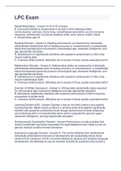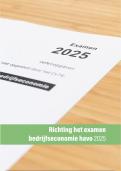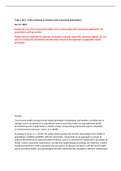Exam (elaborations)
LPC Exam complete 2022
- Module
- Institution
Mental Retardation A. IQ of 70 or below B. Concurrent deficits or impairments in at least 2 of the following areas: communication, self-care, home living, social/interpersonal skills, use of community resources, self-direction, functional academic skills, work, leisure, health, safety C. Onset b...
[Show more]





